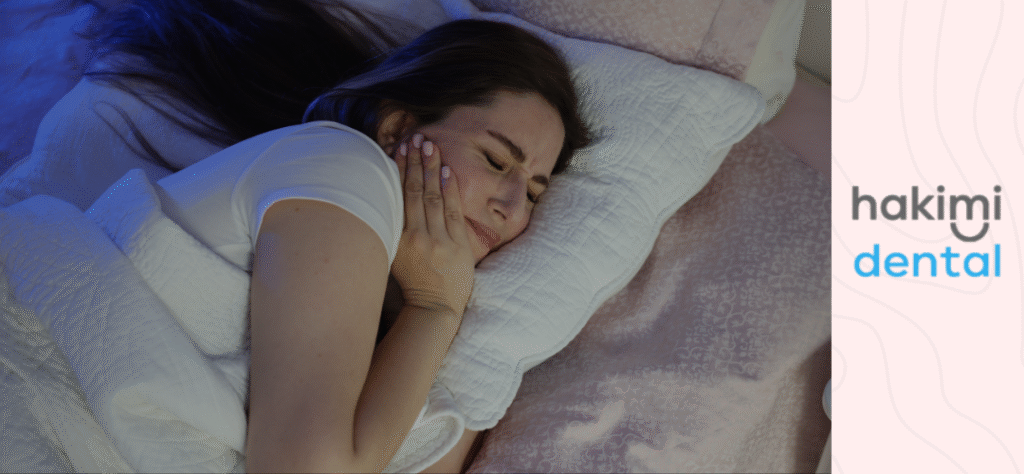An Oldbury dentist’s guide (and what to do)
If you’re sitting up at 2am wondering why does toothache get worse at night, you’re not alone. Many patients tell us they’re fine during the day, then the pain flares as soon as they lie down. In this guide, our clinicians at Hakimi Dental Clinic in Oldbury explain the real reasons toothache at night often ramps up, what you can do right now to feel more comfortable, and how we fix the cause so you can sleep again.
Need help urgently? We offer same-day emergency appointments — often 7 days a week. Book here: Emergency dentist in Oldbury. For routine care and prevention, start with a check-up or visit our home page.

The short answer: why toothache is worse at night
Wondering why is toothache worse at night when it barely bothers you at lunchtime? There are a few simple reasons:
- Lying down increases pressure in the head and neck. When you’re horizontal, blood flow to the head increases slightly. In an inflamed tooth, that extra pressure can make the nerve feel more “boxed in”, so the ache feels stronger.
- Fewer distractions, more awareness. During the day you’re busy; at night the same sensation has your full attention.
- Saliva flow drops while you sleep. Saliva buffers acids, washes away food and helps soothe tissues. Less saliva means a drier mouth and more irritation.
- Night-time clenching or grinding. Many people clench in their sleep. That loads tender teeth and jaw muscles, so toothache at night can spike each time you bite down unconsciously.
- Painkillers wear off. If your last dose was hours ago, the effect may be fading just as you get into bed.
- Sinus pressure and colds. Congested sinuses sit above upper back teeth and can make a sore tooth throb when you lie flat.
- Temperature changes. Cooler night-time air or a cold bedroom can trigger sensitive teeth.
- Late-night snacks and drinks. Sugar or acidic drinks before bed irritate exposed dentine and inflamed gums.
So when you ask why does a toothache get worse at night, it’s usually a mix of normal body rhythms plus an underlying dental problem that needs attention.
If pain is severe, don’t wait. Book an emergency visit now so we can settle things safely.
What’s really causing the pain?
Night-time pain is a symptom, not a diagnosis. Common dental causes include:
- Tooth decay that has reached the dentine or nerve (pulp)
- Reversible or irreversible pulpitis (inflammation of the nerve)
- Cracked tooth or broken filling — often worse on biting or release
- Dental abscess (infection) — may come with swelling or a bad taste
- Gum infection or food packed between teeth causing pressure
- Erupting or impacted wisdom teeth
- Tooth wear and sensitivity from grinding, acid erosion or gum recession
At Hakimi Dental Clinic, our clinicians use careful examination and digital X-rays to pinpoint the cause and stop the pain at its source — not just mask it. Depending on the diagnosis, treatment might be a dental filling, root canal treatment or, where a tooth can’t be saved, a gentle extraction. Whatever you need, we’ll talk you through options in plain English.
Why does toothache get worse at night? A closer look at the main culprits
1) Pressure changes when you lie down
Inside a tooth, the nerve sits in a rigid space with little room to swell. Lie flat and blood flow rises slightly, which can heighten pressure. That’s one of the reasons patients ask why does toothache get worse at night even when pain felt manageable all afternoon.
2) Saliva takes a break
Saliva production naturally dips as you head to bed. Less saliva means less buffering of acids, more dryness and a higher chance that cold air or a trickle of something sweet will sting. This is a key reason why is toothache worse at night for people with sensitive teeth or gum recession.
3) Night-time habits
Grinding, clenching and mouth breathing are common during sleep. Clenching drives microscopic cracks and irritates the ligament that holds the tooth in its socket. Mouth breathing dries tissues and can make inflamed gums feel raw by morning.
4) Painkillers wearing off
If you last took pain relief at teatime, it may be fading by bedtime. We’ll cover how to plan this better below, but if you’re relying on tablets every night, it’s time to see us for a proper fix.
5) Sinus pressure
Blocked or inflamed sinuses can mimic a toothache — especially in the upper molars. When you lie down, sinus pressure shifts and throbbing can intensify, contributing to toothache at night even when the teeth are otherwise healthy.
What you can do tonight (comfort steps that are safe and sensible)
These tips can make sleep easier. They are not a cure — they simply take the edge off until we treat the cause.
- Prop your head. Two pillows or a wedge pillow keep your head elevated and reduce pulsing pressure.
- Cold compress on the cheek. Ten minutes on, ten off. Avoid heat on a suspected abscess — it can worsen swelling.
- Saltwater rinse. A warm saline rinse (half a teaspoon of salt in a mug of warm water) can soothe gums and clear debris. Don’t swallow.
- Gentle cleaning. Floss or use interdental brushes to remove trapped food; brush with a soft brush and a fluoride toothpaste before bed. Our dental hygienist can show you techniques that help sensitive areas.
- Temporary protection. If a sharp edge is catching your cheek or tongue, dental wax (from the chemist) can help until your appointment.
- Mind your timing. If you use over-the-counter pain relief, take it at a sensible interval so it’s working when you go to bed (always follow the packet instructions or speak to a pharmacist).
- Keep it cool and neutral. Avoid very hot or cold food and drink late at night; stick to soft foods on the other side.
- Skip aspirin on the gums. It can burn soft tissues.
- Book the fix. Comfort measures are short-term. If you’re still asking why does a toothache get worse at night after a couple of evenings, you need a diagnosis. Book online or use our emergency service.
How we stop night-time toothache for good
At your appointment we’ll:
- Listen and assess
You tell us when it hurts, what sets it off and what helps. We check your medical history, examine the area and take any necessary X-rays. - Settle the pain
If you arrive in acute discomfort, we prioritise relief — smoothing a sharp edge, easing pressure, draining an abscess if appropriate, or placing a soothing dressing. Our anaesthetics are effective and gentle. - Treat the cause
- Early decay or broken fillings: we restore with high-quality dental fillings to seal the tooth and protect the nerve.
- Irreversible pulpitis or abscess: we can often start root canal treatment the same day to clear infection and save the tooth.
- Cracks and heavy bite: we may place a protective restoration and discuss a custom nightguard to prevent further damage.
- Unrestorable teeth: if a tooth can’t be saved, we’ll talk through gentle extraction and replacement options.
Stable, comfortable nights start with healthy teeth and gums. Regular check-ups and visits with our hygienist help catch small problems before they wake you at midnight.
When to call us urgently
Please contact us the same day — or use our emergency dentist service — if you notice:
- Facial swelling or a rapidly spreading infection
- Fever, feeling unwell, or swollen glands
- Pain after an injury, especially with loose or displaced teeth
- Difficulty swallowing or opening your mouth
- A broken tooth with pain on biting
- Severe pain that doesn’t settle with over-the-counter pain relief
These are signs that “wait and see” isn’t the right approach.
Sleep better in the long term: our prevention checklist
If you keep getting toothache at night, prevention is key:
- Routine examinations: book regular check-ups so we can spot problems early.
- Professional hygiene: tailored cleaning and home-care coaching with our hygienist reduce gum inflammation and sensitivity.
- Fix wear and cracks: if you clench or grind, ask about a nightguard.
- Treat sensitivity: desensitising toothpastes, fluoride gels and small protective fillings can calm trigger points.
- Don’t postpone “little niggles”. A small cavity today is a 2am throb next month. Quick fillings are simpler, cheaper and far more comfortable than waiting for a flare-up.
- Mind late-night snacks and drinks: keep sugary and acidic foods to mealtimes; water is the best bedtime drink.
- Medication review: some medicines dry the mouth. If you think this applies, mention it at your check-up.
Why patients trust Hakimi Dental Clinic
- Our GDC-registered dentists have extensive experience diagnosing and treating the causes of night-time dental pain, from simple sensitivity to complex root canal cases.
- We manage dental emergencies daily and offer same-day appointments whenever possible.
- We use recognised diagnostic protocols, modern imaging and evidence-based treatments — explained clearly so you can choose confidently.
- Transparent fees, written treatment plans and follow-up. Read more about our ethos and services on our website.
Your next steps
- In pain now? Book a same-day emergency appointment.
- Want to stop the cycle? Arrange a check-up and let’s sort the cause.
- Need treatment options? Explore dental fillings and root canal therapy.
- New to us? Learn more about our team and services on our website.
FAQs about toothache at night
When you lie down, pressure changes make inflamed nerves more sensitive; saliva flow drops; painkillers may have worn off; and there are fewer distractions. Grinding in your sleep can add to the ache. If you keep wondering why does toothache get worse at night, it’s a sign the tooth needs a proper assessment. Book an appointment.
Night-time is quieter and cooler, saliva is lower, and you’re more aware of every twinge. That’s why many people ask why is toothache worse at night despite feeling fine at work. The fix is to treat the cause – often a small cavity, a cracked cusp or an inflamed nerve – rather than relying on painkillers.
Prop your head, use a cold compress, rinse with warm saltwater, keep the area clean, avoid very hot or cold food and follow the packet if you take pain relief. Don’t place aspirin on the gums. If pain is severe or you notice swelling, use our emergency dentist service.
It depends on the diagnosis. Early decay or a chipped filling is often solved with a filling. If the nerve is inflamed or infected, root canal treatment can save the tooth and stop the night-time throbbing.
We do our best to see patients the same day, including weekends whenever possible. Book online or call our emergency dentist in Oldbury team now. For long-term peace of mind, keep up regular check-ups so small problems don’t become 2am wake-ups.
